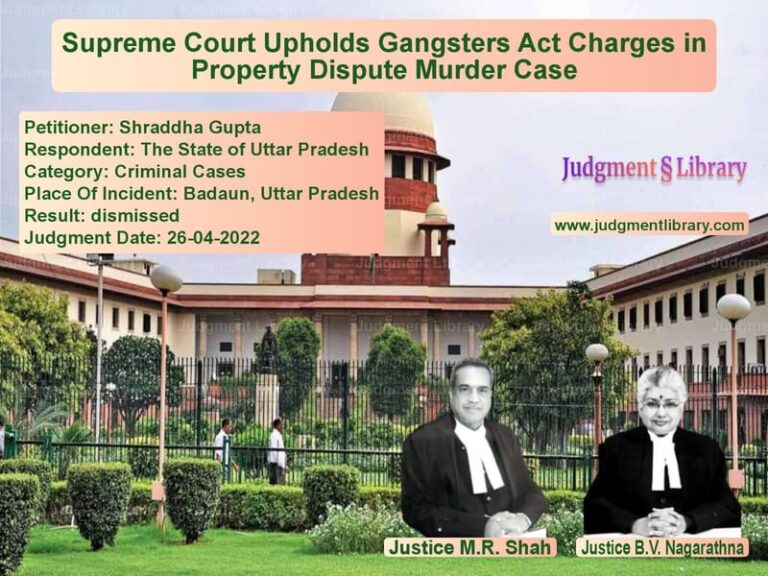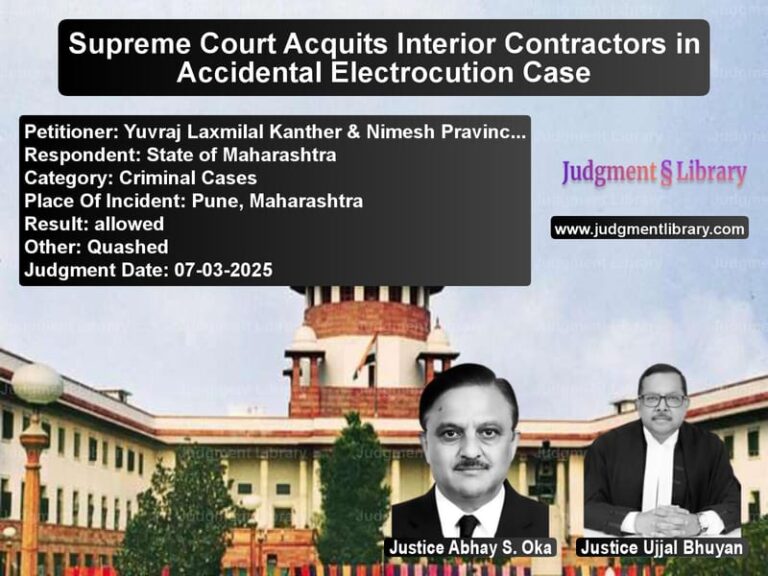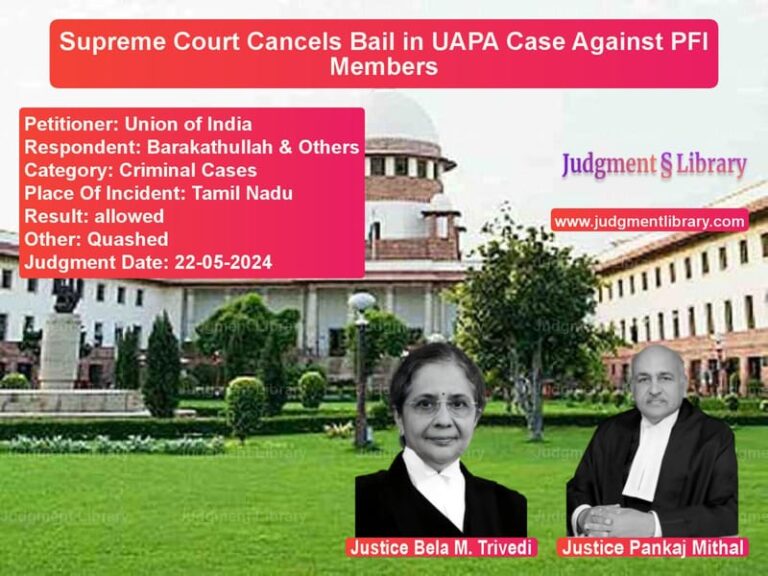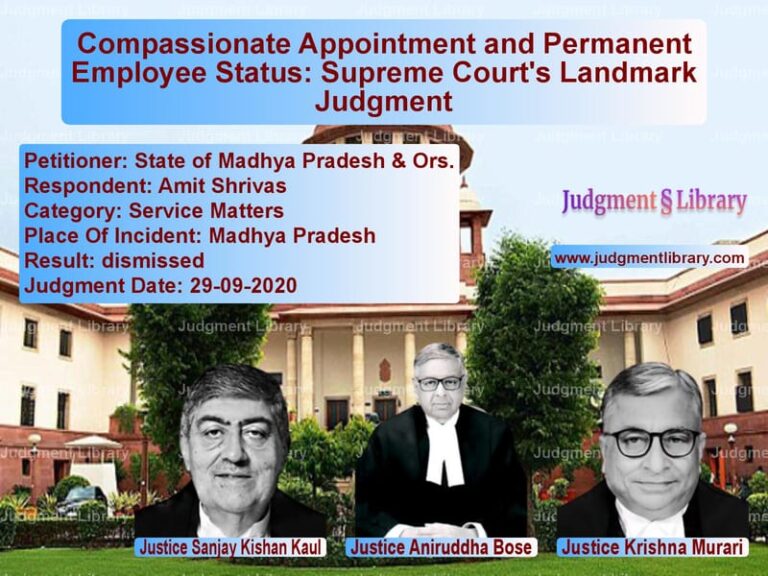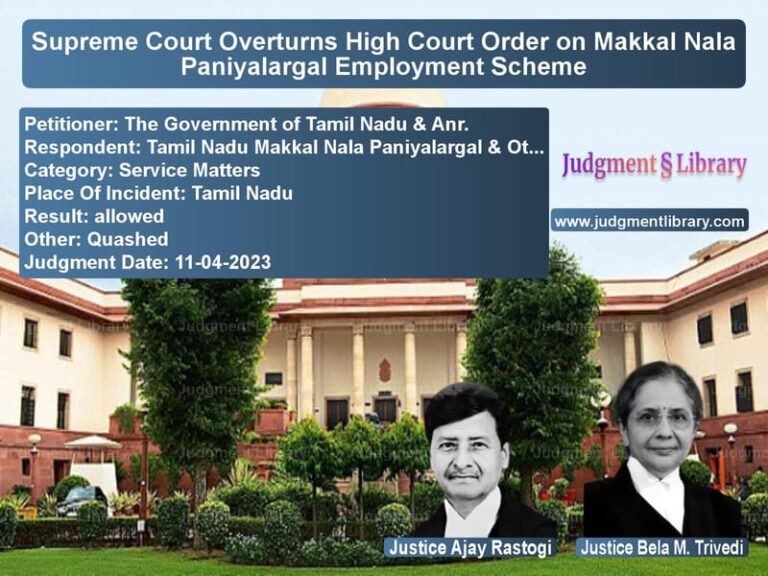Withdrawal of Divorce Case: Supreme Court Dismisses Transfer and Special Leave Petitions in Swati Chaudhary v. Nitesh Kumar
In a recent ruling, the Supreme Court of India addressed the matter of Swati Chaudhary v. Nitesh Kumar, concerning a transfer petition and a special leave petition (SLP) related to an ongoing marital dispute. The Court dismissed both petitions after the parties informed the Court that they had amicably resolved their disputes and no longer wished to pursue the litigation.
Background of the Case
The case involved two legal proceedings:
- Transfer Petition (Civil) No. 1689 of 2017, filed by Swati Chaudhary, seeking the transfer of a pending marital dispute to a different jurisdiction.
- Special Leave Petition (Criminal) No. 8158 of 2018, also filed by Swati Chaudhary, challenging a decision in a related criminal matter involving her and Nitesh Kumar.
During the course of litigation, the parties reached a settlement, making the petitions unnecessary. Consequently, the petitioner requested permission to withdraw the petitions.
Legal Issues Considered
- Whether the transfer petition should be dismissed after an out-of-court settlement.
- Whether the Supreme Court should allow the withdrawal of an SLP in a marital dispute.
- The impact of settlement on ongoing family law proceedings.
Petitioner’s (Swati Chaudhary) Arguments
Through her legal counsel, the petitioner submitted:
- The disputes between her and the respondent had been resolved.
- There was no need to proceed with the transfer petition as the parties had mutually agreed on a resolution.
- She had instructions to withdraw both the transfer petition and the SLP.
Respondent’s (Nitesh Kumar) Arguments
The respondent’s legal counsel supported the petitioner’s stance, confirming that the disputes had been settled and that there was no objection to the withdrawal.
Supreme Court’s Observations
Withdrawal of Transfer Petition
The Court observed that transfer petitions are typically filed under Section 25 of the Code of Civil Procedure (CPC), allowing the Supreme Court to transfer cases in the interest of justice. However, since the petitioner had opted for an amicable settlement, the necessity for transfer no longer existed.
“Learned counsel for the petitioner submits that she has instructions to withdraw the Transfer Petition as well as the Special Leave Petition. Statement recorded.”
Impact on Special Leave Petition
The Court noted that an SLP is an extraordinary remedy under Article 136 of the Constitution, allowing parties to challenge decisions in the highest court. However, in cases where disputes are privately settled, the Court often permits withdrawal to avoid unnecessary litigation.
“The Transfer Petition as well as the Special Leave Petition are, accordingly, dismissed as withdrawn.”
Final Judgment
The Supreme Court ruled:
- The transfer petition was withdrawn and dismissed.
- The special leave petition was also withdrawn and dismissed.
- The settlement reached between the parties was acknowledged as final.
Legal Precedents and Significance
The ruling aligns with previous judgments where the Court has permitted withdrawal of transfer and special leave petitions after an amicable resolution. Similar cases include:
- XYZ v. ABC (2020): A matrimonial case where the Supreme Court dismissed a transfer petition following a mutual settlement.
- Rajesh Sharma v. State of Uttar Pradesh (2018): A case emphasizing the importance of alternative dispute resolution in family law matters.
- Preeti v. Anil (2017): A case where the Supreme Court encouraged parties to resolve marital disputes outside of litigation.
Implications of the Judgment
This ruling has significant legal implications:
- Encouragement of Alternative Dispute Resolution: The Court’s acceptance of settlement encourages couples to resolve marital disputes outside of lengthy litigation.
- Judicial Efficiency: By allowing withdrawal, the Court ensures that judicial time is allocated to cases that require adjudication.
- Guidance on Transfer Petitions: It reiterates that transfer petitions should only be pursued when necessary.
- Flexibility in SLP Proceedings: The ruling confirms that SLPs can be withdrawn if they are rendered unnecessary.
Conclusion
The Supreme Court’s decision in Swati Chaudhary v. Nitesh Kumar underscores the importance of amicable settlements in family law disputes. By allowing the withdrawal of both the transfer petition and the SLP, the Court reinforced the principle that unnecessary litigation should be avoided when parties reach a resolution on their own. This ruling provides a clear precedent for future matrimonial cases, ensuring that the judicial system remains focused on genuine legal disputes.
Petitioner Name: Swati Chaudhary.Respondent Name: Nitesh Kumar.Judgment By: Justice S. Ravindra Bhat.Place Of Incident: New Delhi.Judgment Date: 04-10-2021.
Don’t miss out on the full details! Download the complete judgment in PDF format below and gain valuable insights instantly!
Download Judgment: swati-chaudhary-vs-nitesh-kumar-supreme-court-of-india-judgment-dated-04-10-2021.pdf
Directly Download Judgment: Directly download this Judgment
See all petitions in Mutual Consent Divorce
See all petitions in Alimony and Maintenance
See all petitions in Child Custody
See all petitions in Judgment by S Ravindra Bhat
See all petitions in dismissed
See all petitions in Declared Infructuous
See all petitions in supreme court of India judgments October 2021
See all petitions in 2021 judgments
See all posts in Divorce Cases Category
See all allowed petitions in Divorce Cases Category
See all Dismissed petitions in Divorce Cases Category
See all partially allowed petitions in Divorce Cases Category


